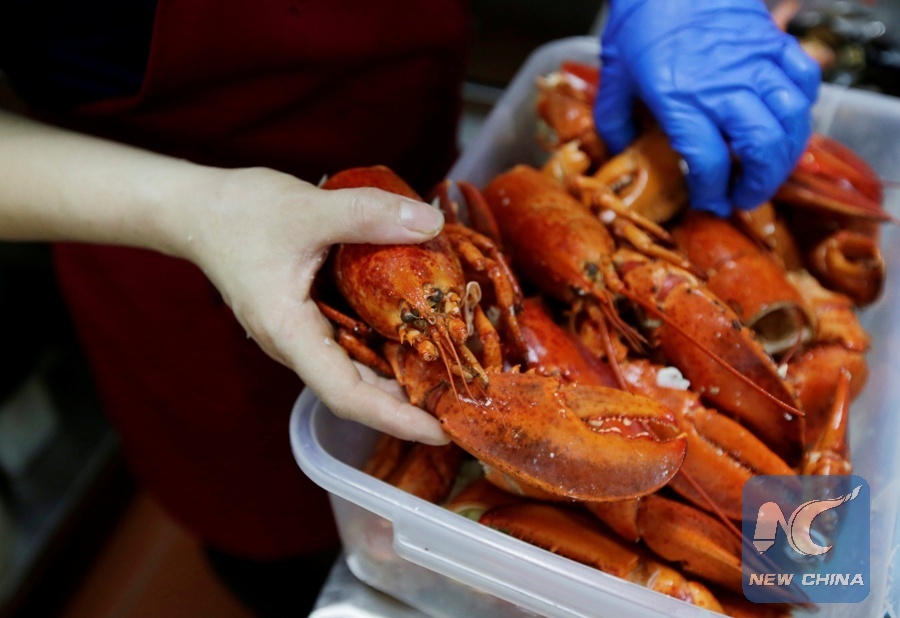
File Photo: A cook prepares to make the lunch of lobsters imported from Boston, U.S., at the kitchen of a seafood restaurant in Beijing, China July 5, 2018. (Xinhua/REUTERS)
NEW YORK, July 12 (Xinhua) -- In 2001, U.S. spirits exports to China amounted to just 959,000 U.S. dollars. In 2017, the figure had jumped to 12.8 million dollars. But the ongoing trade tension between the United States and China has cast a shadow over the otherwise promising growth.
The White House announced 25 percent tariffs on 34 billion dollars of Chinese products Friday, escalating trade tensions between the U.S and China. China retaliated with duties on the same value of U.S. goods.
The retaliatory tariffs China has imposed on U.S. whiskeys could "put the brakes on an American export success story," said Christine LoCascio, senior vice president of international affairs at the Distilled Spirits Council of the United States, which employs approximately 1.5 million people and represents the U.S. spirits sector.
In the latest escalation of its trade offensive against China, the United States said Tuesday it will impose 10 percent tariffs on an additional 200 billion dollars worth of Chinese imports.
LoCascio and her colleagues used to be upbeat about American whiskey's long-term export growth in China, which last year further lowered its tariffs on whiskeys and brandies to 5 percent as part of a wider effort to lower tariffs on a range of consumer goods imports.
Now LoCascio can only hope the two largest economies could "soon resolve their differences" so that the interests of U.S. whiskey exporters and farmers as well as Chinese consumers can be protected.
HUGE RIPPLE EFFECT ON US ECONOMY
The tit-for-tat tariffs are going to have a huge ripple effect on the U.S. economy, experts and industry leaders said.
Like the whiskey distillers, American farmers producing soybean, dairy, cotton, lobsters, apples and much more, are feeling the heat.
"The tariffs will impact almost everybody in Maine as people in the state are more or less involved in the industry," Annie Tselikis, executive director of the Maine Lobster Dealers' Association, told Xinhua.
China accounts for 15 to 20 percent of the export value of U.S. lobsters, she said. There are roughly 4,500 licensed lobster catchers in Maine and about 10,000 to 12,000 people are directly employed in the industry.
With China's retaliatory tariffs, Tselikis said the U.S. lobster industry will further lose its edge over its archrivals, such as Canada, which struck a trade agreement with the European Union last year that will cut tariffs on lobsters in five years.
"Soybeans are the top agriculture export for the United States, and China is the top market," John Heisdorffer, president of the American Soybean Association, said in a recent statement. "The math is simple. You tax soybean exports at 25 percent, and you have serious damage to U.S. farmers."
Jaime Castaneda, senior vice president of the U.S. Dairy Export Council, said the retaliatory tariffs have been a "one-two punch" that has left the industry reeling.
Dairy producers, who had three years of low prices, were expecting to get back to profitable margins this fall. "All that is gone now," Castaneda said.
The China market has significant growth potential for U.S. apple farmers, Tracy Grondine, a spokesperson for the U.S. Apple Association, said.
The industry gained access to the China market -- the largest consumer market in the world -- about three years ago. Now China is its sixth largest export market, according to Grondine.
"If momentum is lost it will be difficult to regain. What we will likely see happening in the short-term is apples that were destined for export markets will instead overhang the U.S. market," she said.
The decision to impose tariffs on Chinese goods will also impact a wide rang of American industries because of the intricate links with international supply chains. For example, the tariffs will affect parts of planes and vehicles made in China.
US CONSUMERS TO SUFFER
"To escalate the trade war is going to be bad for the Chinese economy, for sure, but it's also going to be bad for the U.S. economy, because much of the consumption in this country is produced by Chinese companies," Yasheng Huang, a professor at MIT's Sloan School of Management, told PBS NewsHour.
"A lot of the components sourced by U.S. companies are produced by Chinese companies," he said.
The newly imposed tariffs on Chinese goods will "harm American consumers and businesses" without addressing U.S. trade issues with China, Josh Kallmer of Information Technology Industry Council said in a statement. "Too many jobs and livelihoods are at stake to continue escalating this trade war."
The situation threatens to worsen as the Office of the U.S. Trade Representative released a new round of 10-percent tariffs on Chinese goods with a value of 200 billion dollars. The proposed tariffs could take effect after public consultations which end on August 30.
"American families are the ones being punished," said Hun Quach, vice president of international trade for Retail Industry Leaders Association. "Consumers, businesses and the American jobs dependent on trade are left in the crosshairs of an escalating global trade war."
(Xinhua reporters Chang Yuang, Zhang Yichi, Wang Wen, Zhang Mocheng contributed to this report.)

